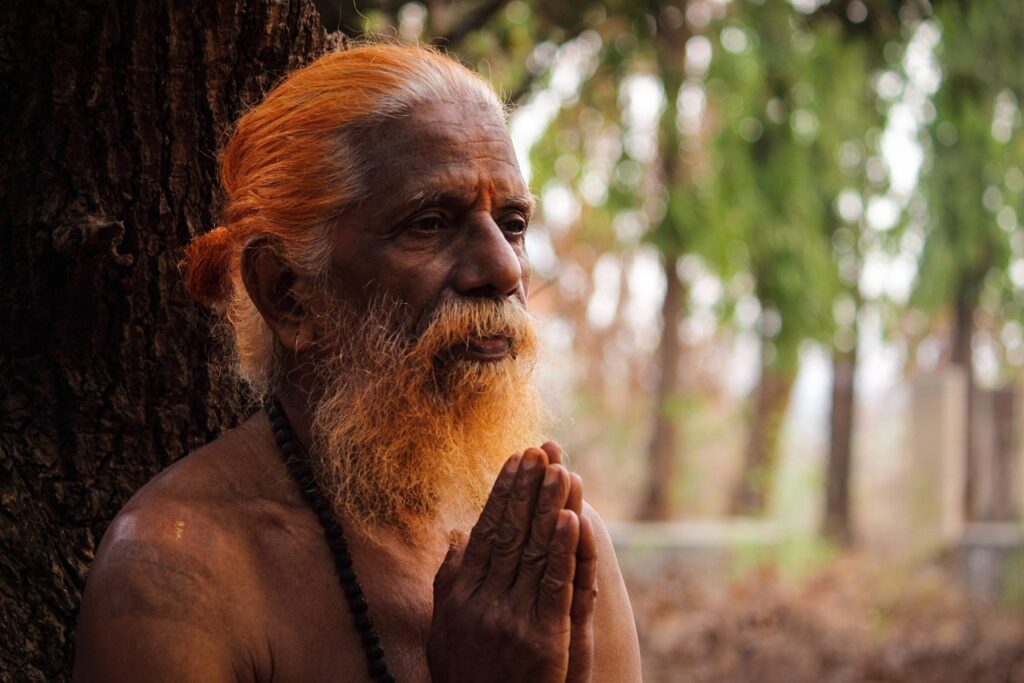
In the midst of our fast-paced and demanding lives, anxiety has become an all-too-common companion. Its grip can be suffocating, robbing us of inner peace and joy. While conventional methods offer effective solutions, exploring the realm of spirituality can provide a profound source of healing and tranquility. In this article, we will delve into the depths of anxiety and unveil spiritual practices that can guide us towards liberation. By tapping into the wellspring of spiritual wisdom, we can cultivate a resilient mindset, restore balance to our lives, and reclaim our inherent state of serenity. Join us as we embark on a transformative journey, discovering spiritual solutions that transcend the limitations of the mind and illuminate the path to lasting peace. It is time to unlock the spiritual toolbox within us and overcome anxiety, embracing a life of profound spiritual well-being.
#1 Exploring the Inner Causes of Anxiety
Sociological studies consistently reveal an intriguing trend: people in developed nations tend to experience higher levels of anxiety compared to those in developing countries. This seems counterintuitive since individuals in developing nations face more external uncertainties related to basic necessities such as food, shelter, and utilities. However, a lesser-known cause of anxiety emerges in developed nations—inner instability. When materialism becomes pervasive in a culture, individuals’ self-worth and identity become tied to external possessions, often non-essential status symbols glamorized by society. This dependency on transient material things fosters internal instability, leading to constant worries about appearances and social validation. The Bhagavad-gita warns that materialism fuels perpetual anxiety. To counter this, outer material development proves insufficient; inner spiritual development is essential. Yoga, especially bhakti-yoga, offers a potent path for inner growth. By cultivating love and connecting with our unchanging spiritual essence, anchored in the shelter of God, we can minimize status-related anxiety and effectively address necessary concerns, finding stability amidst the tumultuous waves of anxiety.

#2 Overcoming Fear of the Future
Amidst the uncertainty and foreboding that accompany encounters with an unknown and potentially menacing future, our minds often fall prey to the clutches of paranoia and fear. The Bhagavad-gita, with its profound wisdom, delivers a poignant caution, asserting that fearfulness becomes the defining characteristic of a mind ensnared by ignorance.
However, the intricate bond between fear and ignorance warrants deeper exploration. Fear emerges as a consequence of our failure to grasp the fundamental truth that the only reality we truly confront is the present moment, not the uncertain terrain of the future. Within the confines of the present, we discover a sanctuary, shielded from the perils that await us down the winding paths of time, as long as we do not succumb to paralysis and neglect the necessity of suitable preparation.
To embark on a profound contemplation of the impotence of the future to inflict harm upon us in the present, we must arm ourselves with spiritual education and cultivate a tender connection of devotion. Spiritual education stands as an indomitable force, an empowering tool that equips us to navigate the labyrinth of existence. The teachings of the Bhagavad-gita illuminate our understanding, revealing that we are eternal spiritual beings, capable of transcending the limitations imposed by our external circumstances and emotional fluctuations. Irrespective of the threatening façade assumed by the future, our eternal essence, our soul, remains impervious to its tumultuous tides, eternally unharmed in both the present and the days yet to unfold.

Additionally, fostering a devotional connection serves as an ever-present reminder of our timeless relationship with the divine, with God. As integral fragments of the divine whole, we are in constant communion with the divine essence. In His benevolence, God expects nothing more from us than to embrace our assigned roles and responsibilities, harmoniously nestled within the boundaries of the present moment. This gift of the present bestows upon us an invitation to engage in acts of pure, selfless love and service. Meanwhile, the future, intertwined with the threads of destiny and the tapestry of time, rests securely in the gentle hands of God. By dedicating ourselves wholeheartedly to His service in the present, He manifests His eternal presence within us, guiding us from the depths of our being. In His divine guidance, we discover a reliable compass that navigates us through the labyrinthine corridors of the future, leading us unwaveringly towards a place of safety and solace.
#3 Connect with Your Inner Self through Mantra Meditation:
Meditation is a profound spiritual practice that allows us to connect with our inner being and find solace amidst life’s turmoil. Meditation is a practice that has been around for centuries if not thousands of years, but has recently gained popularity as more and more people seek ways to improve their mental health and well-being. It involves focusing the mind, thought, or activity to achieve a state of relaxation and inner peace. From Hindus and Buddhist monks to modern-day celebrities, meditation is now practiced by millions of people worldwide. The Bhagavad Gita, an ancient Hindu text, teaches us that the true mastery lies in conquering the mind, for only then can we achieve the perfection of life and attain inner peace. Those who attain such tranquility have a remarkable ability to view all aspects of life with equanimity, seeing happiness and distress, heat and cold, honor and dishonor as mere fleeting phenomena. According to the Bhagavad Gita, one who has conquered the mind regards everyone with an equal mind, be it a well-wisher, benefactor, neutral, mediator, envious, friend, enemy, pious, or sinner. The objective of meditation, as elucidated in the Bhagavad Gita, is to attain God, making Him the ultimate goal of one’s life.

In the present day and age, it is recommended that the ideal process to control one’s mind is to engage in chanting the holy names or Mantra meditation. The ancient Vedic texts proclaim that chanting the holy Name of the Supreme Lord is the most effective way to cultivate spiritual realization in this present age of quarrel and confusion (Harer nama Harer nama Harer namaiva kevalam kalau nasthyeva nasthyeva nasthyeva gathir anyatha – Brhan Naradiya Purana). There is nothing else as powerful as chanting the holy name of the Lord. The holy name is non-different from the Lord and is endowed with all His potencies. Repeated chanting of the holy names purifies one’s heart and rekindles one’s dormant love for the Supreme. When an individual spiritualizes their consciousness through Mantra Meditation, their mind follows the directives of the intelligence, which makes decisions based on a spiritual reality. This is why Mantra Meditation is one of the most effective techniques to attain a peaceful mind. By continuously chanting the holy names of the Lord, one’s mind becomes focused and attains a state of tranquility. The Kali Santarana Upanishad recommends the Hare Krishna Mahamantra as the foremost Mantra for spiritual attainment in the present age –
Hare krsna hare krsna krsna krsna hare hare
Hare rama hare rama rama rama hare hare
Iti sodasakam namnam kali kalmasa nasanam
Natah parataropayah sarva vedesu drsyate
(Kali Santarana Upanishad)
–
The sixteen syllables of the Hare Krishna Mahamantra: ‘Hare Krishna Hare Krishna Krishna Krishna Hare Hare, Hare Rama Hare Rama Rama Rama Hare Hare’ destroy all inauspiciousness in this age of Kali. This is the verdict of the Vedas.
#4 Cultivating Gratitude:
Gratitude serves as a powerful spiritual practice, bringing about profound transformations within us. It redirects our attention from feelings of scarcity to recognizing the abundance present in our lives. It also shifts our mindset from despair to a renewed sense of hope. It is essential to dedicate a portion of our daily lives to reflect upon the blessings we have received. Through this reflection, we express gratitude for the simple joys that bring us happiness, the valuable lessons learned from overcoming challenges, and the interconnectedness that binds all living beings together. By actively cultivating an attitude of gratitude, we open ourselves up to positive energy, altering our perspective on life and uplifting our spirits.
One effective way to reinforce this practice and enhance our spiritual connection is to keep a gratitude journal or create gratitude affirmations. These practices further deepen our awareness of the blessings bestowed upon us, allowing us to fully embrace and appreciate them. When we perceive our blessings as acts of divine benevolence, we experience an overwhelming sense of joy and contentment. “Blessing” encompasses the encounter with God’s kindness, mercy, and goodness that enriches our lives. It becomes a pivotal aspect of our spiritual journey, propelling us to explore the profound mysteries of our faith and discover the hidden treasures that lie within.

Blessings hold the power to empower believers, enabling them to achieve seemingly insurmountable feats and dedicate their lives in devoted service to God. They are also a means through which we perceive the presence of the divine in our lives. According to tradition, God is ever ready to bestow blessings upon us. However, we must be prepared to receive them. This means that blessings may not always align with our immediate desires but are granted when we have proven ourselves deserving through our unwavering devotion and virtuous actions. By understanding this, we embrace the idea that blessings come to us in divine timing, when we are truly ready to receive and appreciate them.
#5 Connecting with Nature:
The awe-inspiring beauty and divine energy of nature have the ability to revitalize our spirits during times of despair, serving as a guiding force in our spiritual journeys. It is important to seize the opportunity to immerse ourselves in natural surroundings, whether it be the serene embrace of a forest, the captivating allure of a picturesque garden, or the peaceful tranquility of a beach. As we surrender ourselves to these environments, we open our senses to the enchanting beauty and harmonious essence of nature, allowing them to calm our racing thoughts and reignite our connection with the divine energy that permeates all of creation.
Engaging in activities such as nature walks, meditating in natural settings, or simply finding a quiet place to contemplate enables us to absorb the healing vibrations that emanate from the natural world. It is crucial to acknowledge that the material nature we encounter is intricately linked to the divine plan of the Supreme Lord. By recognizing the hand of God in the intricate workings of the world around us, we gain a deeper understanding of reality as a manifestation of divine intelligence and purpose.
 Nature, under the watchful guidance of the Supreme Lord, generously provides us with the resources and opportunities necessary for self-discovery and healing during our lowest moments. Throughout history, seekers of spiritual enlightenment sought solace in tranquil forests, recognizing that the serenity of nature served as the perfect backdrop for profound meditation and communion with the divine. By immersing ourselves in nature, we open ourselves to the abundant blessings and divine grace that nurture not only our physical well-being but also our mental and spiritual states.
Nature, under the watchful guidance of the Supreme Lord, generously provides us with the resources and opportunities necessary for self-discovery and healing during our lowest moments. Throughout history, seekers of spiritual enlightenment sought solace in tranquil forests, recognizing that the serenity of nature served as the perfect backdrop for profound meditation and communion with the divine. By immersing ourselves in nature, we open ourselves to the abundant blessings and divine grace that nurture not only our physical well-being but also our mental and spiritual states.
The abundant offerings of nature, such as wholesome fruits and vegetables, nourish us not only physically but also spiritually, increasing our receptivity to divine wisdom. It is believed that sacred rivers like the Ganges and plants like the holy Tulasi possess divine origins, and by associating with them, our souls reconnect with their original divine nature. In the embrace of nature, we witness the tender care of a loving mother, providing solace and support when we seek refuge in her presence. When we remain connected to our roots, to the nurturing essence of nature, our lives flourish with vitality, purpose, and harmony.
Therefore, whenever you find yourself feeling low, remember that nature holds the key to your spiritual rejuvenation. Take the time to embrace the wonders of the natural world, allowing its breathtaking beauty and serene tranquility to uplift your spirits and awaken a profound sense of awe and gratitude within you. In the embrace of nature, you will rediscover your deep connection with the divine, and your life will flourish with renewed energy, peace, and spiritual growth.
#6 Prayer – Seeking Guidance from Higher Power:
In times of despair, turning to a higher power can provide immense comfort and strength. Whether you identify as religious or simply spiritual, prayer, or connecting with the divine energy of the universe, can be a powerful source of solace. Engage in heartfelt conversations with the divine, expressing your worries, seeking guidance, and surrendering your burdens. Trust that your prayers and intentions are heard and that divine support is always available to uplift your spirits and guide you towards the path of bliss.
The Bhagavad Gita, a revered ancient scripture, provides a profound classification of prayers into three distinct types, each influenced by a specific mode of nature: ignorance (tamas), passion (rajas), and goodness (sattva).
Prayer in the mode of ignorance is exemplified by the story of the demon Hiranyakashipu. Despite his eloquent Sanskrit praises to Lord Brahma, his intentions were dark and self-centered. His prayer revolved around conquering others, defeating enemies, and attaining invincibility in battle. It was a prayer driven by ignorance, devoid of understanding the true essence of spirituality. Sadly, such distorted prayers can still be found today, as even terrorists seek solace in places of worship, praying for success in causing harm to innocent lives.
On the other hand, prayer in the mode of passion is commonly observed in various religious settings. People implore God for material gains such as wealth, fame, and power. Churches, mosques, and temples become the platforms where individuals ask for personal prosperity, driven by their passionate desires and ambitions. These prayers, rooted in the mode of passion, are focused on fulfilling worldly aspirations rather than attaining spiritual enlightenment.

In contrast, prayer in the mode of goodness transcends the narrow confines of personal desires and extends to the well-being of others. The example of Mother Teresa beautifully illustrates this type of prayer. Despite her humble background and lack of material resources, she dedicated herself to selfless service for the poor and needy. Her heartfelt prayers were for peace, happiness, and the alleviation of suffering for those less fortunate. Her prayers were not aimed at accumulating wealth or worldly success but rather at making a positive difference in the lives of others. And in the end, her sincere prayers were answered.
Beyond the previous three modes of prayer, there exists a superior form known as prayer in the mode of transcendence. Transcendental prayer surpasses the limitations of the material energy, connecting with the eternal and divine realm. Devotees who engage in such prayers seek an unadulterated, unconditional, and eternal loving relationship with the Supreme Lord. They express deep reverence, glorifying the Lord, appreciating His mercy, and yearning to engage in His devotional service. Their prayers are rooted in pure devotion, surpassing personal desires and self-centered motivations.
In conclusion, the Bhagavad Gita provides a profound understanding of prayers categorized into different modes of nature. While prayers influenced by ignorance and passion may be driven by self-centered desires or material ambitions, prayers rooted in goodness focus on the welfare of others and alleviating suffering. However, the highest form of prayer lies in transcendence, where devotees seek an eternal and loving connection with the Supreme. By understanding these distinctions, one can approach prayer with a deeper understanding and strive for a spiritual connection that goes beyond the temporary and mundane aspects of life.
#6 Step through New Doors :
When we invest considerable effort in pursuing a specific goal, be it in our career, relationships, or life’s purpose, it can be devastating when things don’t unfold as planned. The absence of a logical explanation for our failure can make it even more challenging, as it feels as if life itself is rejecting our aspirations.
So, how can we resist the temptation to give up on life when faced with setbacks? One approach is to recognize that our current understanding of life is limited and that life encompasses far more than we might realize. The ancient Vedic scriptures offer profound teachings, stating that we are immortal beings on a spiritual journey that spans multiple lifetimes. What propels our growth may differ significantly from what we perceive as a mere “yes” or “no” from life, as these judgments often arise from our incomplete comprehension of its workings. The Bhagavad-gita (05.20) highlights the power of cultivating an expansive perspective on life, emphasizing that those anchored in spiritual wisdom remain steadfast in the face of both pleasure and pain.

By embracing this spiritual insight, we can view a setback not as a rejection of life itself but as a closed door leading to new opportunities. Rather than expending our energy trying to understand why a particular door has closed, we shift our focus and intelligence toward exploring alternative paths. Embracing a broader vision of life enables us to move beyond frustration and discover new avenues for progress. With resilience and a sense of purpose, we can navigate life’s most challenging setbacks and emerge stronger from the experience.
A Poetry – Overcoming Anxiety
In the midst of life’s demanding pace,
Anxiety clings to us, a suffocating embrace.
But fear not, for within the realm of the soul,
A profound source of healing can make us whole.
Conventional methods may offer relief,
Yet spirituality holds a transformative belief.
Let us delve into anxiety’s depths,
And uncover practices that restore our steps.
Materialism, a cause often unseen,
Ties self-worth to possessions, a turbulent scene.
But inner growth through bhakti-yoga’s art,
Connects us to love, a tranquilizing start.
The fear of tomorrow, a lingering plight,
Binding us in ignorance, casting shadows in our sight.
Yet in the present moment, a haven we’ve tread,
Prepared and devoted, let serenity spread.
With anticipation, we face the days ahead,
Guided by resilience, no longer feeling misled.
Embrace the unknown, let dread take flight,
In our hearts, courage ignites, shining bright.
Mantra meditation, a practice profound,
Connects us to our being, peace is found.
Chanting the holy names, a powerful key,
To unlock the mind and set the spirit free.
Cultivating gratitude, a transformative act,
Shifts our focus, keeps our spirits intact.
Reflect upon blessings, both big and small,
Embrace divine benevolence, answer the call.
Nature, a healer in times of despair,
Revitalizes our souls, offering repair.
Embrace its beauty, its harmonious grace,
Reconnect with the divine in its serene embrace.
Through prayer, seek guidance from above,
Find solace, strength, and divine love.
Ignorance, passion, goodness, and transcendence,
Modes of prayer, each with significance.
Step through new doors, embrace the unknown,
With courage and faith, let your spirit be sown.
Overcome anxiety, unlock your spiritual well,
Embrace a life of peace, where serenity dwells.
In the depths of anxiety, a journey awaits,
Where spirituality transcends, opening new gates.
Embrace the wisdom, let your spirit soar,
Overcoming anxiety, forevermore.
